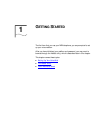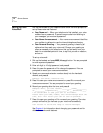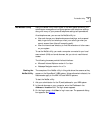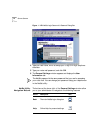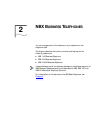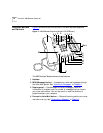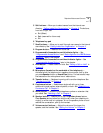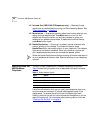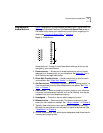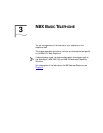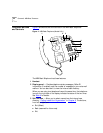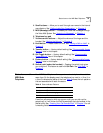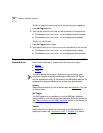
Telephone Buttons and Controls 19
5 Soft buttons —Allow you to select names from the internal user
directory. “Calling Inside Your Organization”
in Chapter 5. The buttons,
from left to right, are:
■ Slct (Select)
■ Back (reserved for future use)
■ Exit
6 Telephone key pad
7 Scroll buttons — Allow you to scroll through user names in the internal
user directory. See “Calling Inside Your Organization”
in Chapter 5.
8 Program button — Reserved for future use.
9 Programmable Access buttons with indicator lights — See
“Programmable Access Buttons”
and “Status Lights on the NBX Business
Telephone” later in this chapter.
10 Programmable Access buttons without indicator lights — See
“Programmable Access Buttons”
later in this chapter.
11 Hold button — Places a caller on hold. See “Placing a Call on Hold” in
Chapter 5
.
12 Microphone (located on the underside of the telephone) —
Activated when the telephone is in speaker phone mode, that is, after
you press Speaker button or Hands Free button. For best results, keep
the area around the microphone free of obstructions.
13 Transfer button — Sends an incoming call to another telephone. See
“Transferring a Call”
in Chapter 5.
14 Conference button — Establishes a single call with up to three
additional internal parties, external parties, or both. See “Establishing a
Conference Call” in Chapter 5.
15 Redial button — Redials the last telephone number or extension that
you called. See “Redialing a Call”
in Chapter 5.
16 Speaker button — Enables you to use the speaker phone feature.
Press Speaker button before you dial the call, when your telephone is
ringing, or while a call is in progress. To turn the speaker phone off and
resume the conversation, pick up the handset.
17 Volume control buttons — Adjust the volume of the ringer, the
speaker, and the handset. See “Setting the Volume”
in Chapter 5.



